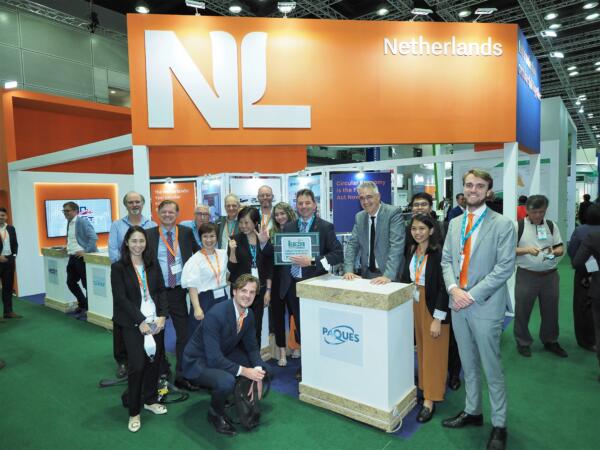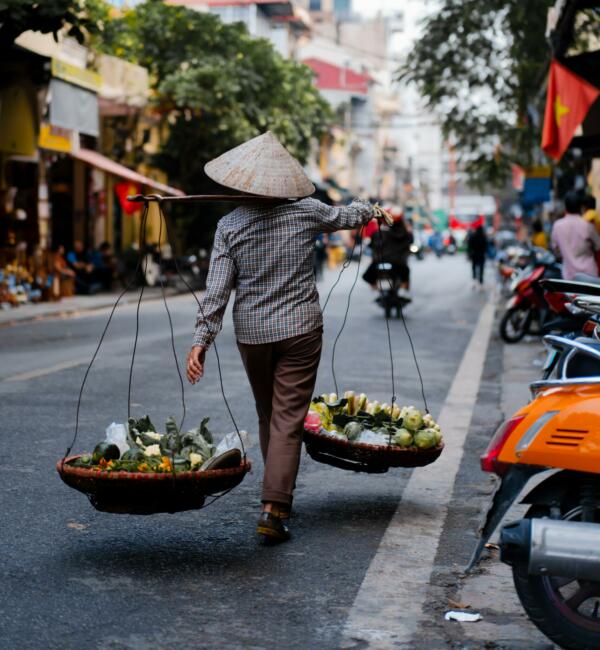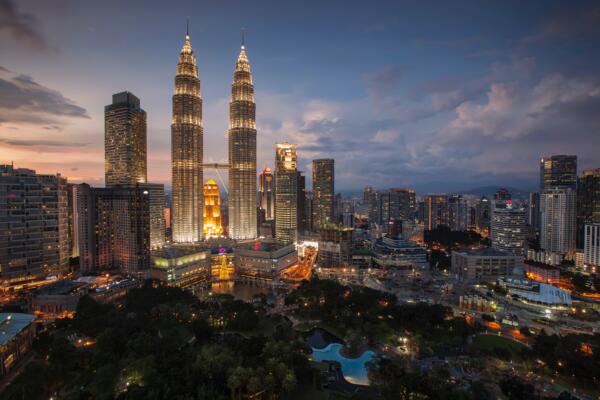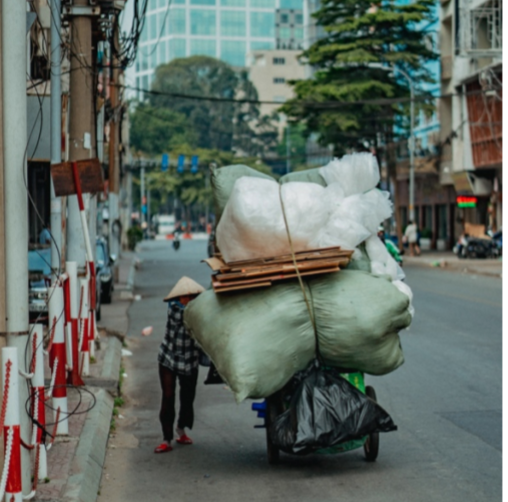Circular economy opportunities in Vietnam
Vietnam is known for its booming economy. Since its opening to the world market in the eighties, the capita GDP growth rose to one of the fastest in the world, leading to significant poverty reduction. On the other side, partially induced by that outstanding economic growth, Vietnam also struggles with increasing resource depletion and scarcity, pollution and degradation of the environment, and intensifying effects of climate change. The awareness and predictions of what is to be awaited in the coming years have triggered the attention for the concept of circular economy as a solution for national challenges.
Thinking about doing business in Vietnam? Below you will find information on policy landscape, circular economy strategy, and selected priority areas!
Economic indicators
- Total Population: 95.5 (2019)
- GDP (nominal + ranking): €314,74 billion , World Ranking: 36
- Purchasing power : €2,740 (2019)
- Import from the NL (€): 1,1 mrd (2018)
- Economic growth: 7.1% (2018)
- Ease of doing business: 70/190 (2020)
- Corruption perception Index:96/180 (2019)
- Unemployment rate: 2% (2018)
- Currency and exchange rate euro: 1 € = 27,119 Dong (2021)
- Time difference with NL: +5 hrs
Circular economy indicators
- Global Innovation Index rank: 42/129 (2019)
- Recycling rate of municipal solid waste: 8-12% (2018)
- Renewable energy consumption (% of total final energy consumption): 10%
Policy landscape
Green Growth Strategy (VGGS)
The Ministry of Planning and Investment is working with relevant ministries, sectors, and localities to draft a National Strategy on Green Growth for 2021- 2030 and a vision for 2050. The draft plan outlines goals for lowering greenhouse gas emissions, assisting all economic sectors in going green, promoting sustainable consumption, and strengthening resilience during the green transition process, among other things, with the goal of making Vietnam a carbon-neutral economy as soon as possible. VGGS 2021-2030 is expected to be submitted for Prime Minister’s approval in June / July 2021.
The revised Law of Environmental Protection (LEP)
The revised Law of Environmental Protection (LEP) will become effective in 2022. Circular economy is a completely new concept introduced in the law to embrace the current development trend in the context that natural resources, fuel and materials have become scarce. The law also sets a new management regime for solid wastes in order to gradually form a circular economy, including application of extended producer responsibility (EPR) policy approach to the recovery and recycling of products and packaging; payment for service charges for collection, transportation and treatment of domestic solid wastes based on the volume of sorted wastes; and self-recycling, treatment, co-treatment of, or recovery of energy from, normal industrial solid wastes.
National Adaptation Plan (NAP)
NAP focuses on (I) reducing vulnerabilities to climate change impacts, by enhancing adaptive capacity and resilience and (II) enhancing the integration of climate change adaptation actions into relevant policies, strategies, programmes and projects. Especially in the socio-economic development planning of ministries, branches and localities. Amongst other focus sectors, natural resources and industry and trade have been selected as priority areas.
Clean Industrial Production
The national strategy Clean Industrial Production targets industrial production to enhance sustainability measures by creating awareness for clean production amongst the industry. Measures are the obligation of medium-and large-scale industrial enterprises to establish dedicated units for cleaner production matters and educate and train staff accordingly. Incentives for investment projects are provided by the government.
‘In Vietnam, our aim is to identify and create business opportunities in the field of circular economy focusing on Agro-Food, Solid Waste Management & Plastics with the use of Dutch expertise, technology and innovation’
Netherlands Embassy in HanoiPlastics
Plastics destroying oceans is a serious issue in Vietnam. According to a study Vietnam ranks fourth place in the world’s list of plastic ocean debris polluters. The Vietnamese Ministry of Natural Resources and Environment estimates that around 8-16% of all national waste is plastic. Today, it is treated together with municipal solid waste, which is mostly discarded in non-sanitary landfills. Mal-managed dump sides and landfills appear to be responsible for 80% of ocean plastics.
International plastic waste is an issue as well. An embargo on low-quality plastic waste by 2025 should prevent further plastic contaminations. Until 2025 national targets aim to reduce plastic waste in marine bodies by 50% and eliminate 100% of single-use plastics. Furthermore, there is an innovative Zero Plastic Waste City project coming up; a social business approach enhancing and formalizing the informal waste picking sector to close gaps in the waste value chain. Upcoming EPR schemes enhance Dutch business opportunities in the field of regional sorting systems, cost-effective food-grade plastics recycling, innovative product design for circular life cycles and alternatives for plastic packaging.
Waste Management
Due to economic- and population growth as well as urbanization, solid waste production from the domestic sector is increasing with 5% annually (8.4% in urban areas). Next to increasing volumes, ineffective and lacking waste management systems cause environmental pollution and implicate health. Fragmented waste management impedes efficiency, and due to insufficient waste collection services, households dispose their waste by dumping or burning, causing air and water pollution.
To improve the current situation, the National Strategy on Solid Waste Management enhances a 3R strategy (reduce, reuse, recycle), and sets ambitious targets for 2025: +90-100% of household waste is collected and treated environmentally friendly, of which 60-90% is reused or recycled. Therefore, 80% of cities with recycling facilities shall realise waste separation at household level. Improved waste management is not only fundamental to reduce Vietnam’s environmental pollution levels, but is also a first step for circular economy. The Dutch journey on waste management provides lessons learnt and shows how the public sector can create enabling conditions for the private sector to take up. Expertise and decades of experience from the Netherlands can provide consultation on the establishment of effective regional waste management systems from collection and sorting to composting and recycling.
Agri-food
Agri-food is an important sector in Vietnam. In 2019, agriculture contributed for almost 14% to the national GDP and employed over 36% of the Vietnamese population (statista). In contrast to the Netherlands, the Vietnamese agro-sector is characterized by smallholder farmers (89% of all farmers). The main challenge of the Vietnamese agro-sector is its efficiency in terms of productivity and use of space. Extensive monoculture is causing deforestation and groundwater pollution, and productivity intensification by using fertilizer and pesticides degrades land quality. Meanwhile, trade agreements with the EU and the RCEP pressure Vietnam to adaptation of social and environmental standards. Knowledge transfer of sustainable- and smart agro-food systems for smallholders is urgently needed to remain production capacity. Being the world’s second largest exporter of agri-food, Dutch business opportunities lay in providing consultation on climate smart (CSA) – and circular agriculture, policy advice, and CSA technology transfer such as greenhouse growing, bio chemicals, and urban agriculture with focus on small-scale farming
Water
Good water quality is vital for the maintenance of Vietnams key economic activities such as agriculture and the tourism sector. Rising sea levels causing salt water to enter the fertile delta area, oversalting freshwater deposits implying water stress and decrease in precipitation lowers water levels of rivers, vital for irrigation activities. Freshwater scarcity can be tackled by innovation of Dutch companies which developed solutions such as drip irrigation systems for efficient water use, water storage systems, and saltwater treatment as an alternative for freshwater supply.
A further constrain is wastewater; despite investments and monitoring attempts by the government, 60-90 % of untreated wastewater is reported to be released into the environment. The circular economy helps to combat contamination by closing water cycles through re-use. The Dutch are world leaders in developing cost-effective wastewater treatment solutions, allowing industries to decrease their water footprint. Since 2010, The Netherlands and Vietnam having a consistent relationship about water, manifested in the Strategic Partnership Agreement on water management. The Mekong Delta Plan offers incitement on Dutch mitigation approaches in the area. Vietnam is looking for technologies for waste water treatments of sewerage and drainage systems as well as water purification for drinking water supply.
Offshore wind farms
Vietnam’s energy demand is ongoingly growing. Renewable energies are promoted and increasing environmental taxes on coal, gasoline and specific chemicals ought to attract investments in green technologies. Due to its long coastline and windspeeds, Vietnam has good preconditions for offshore windfarms. According to the Power Development Plan, wind energy is awaited to contribute 2,1% of produced electricity in 2030. However, technological know-how and expertise on offshore projects are amendable. Development of reusable material options for blades or effective recycling of glass-fibre material is needed to face-out waste and well as re-use and remanufacturing of turbines for life-time extension. Recovery and recycling of undersea cables provide profitable market options. Another priority is the development of solutions of non-disruptive anchoring methods to minimised interruption with sea-life. Building with nature to stimulate the creation of new ecosystems such as coral reef can be a valuable contribution of offshore windfarms. Knowledge transfer is therefore a business case for Dutch companies with experience from the North Sea. There are several opportunities for finance available such as the Vietnam Renewable Energy Development Project by the World Bank or the program by the EIB to mitigate CC in Vietnam. Another interesting perspective is the trade of CERs for wind energy projects as part of the Clean Development Mechanism under the Kyoto Protocol.
Major upcoming events
- International Conference on Renewable, Environment and Agriculture, Ho Chi Minh City (07-03-2021)
- International Conference on Sustainable Environment and Agriculture, Can Tho (22-24 Oct 2021)
Relevant networks
Circular economy networks in Vietnam
Business networks
Embassies
Useful reports
- FAO: Development of organic, plastic-free and fair trade farming systems for small-holders
- The ideation process focused on circular strategies in the wind industry
- Going Circular: A Roadmap for Plastics Recycling in Vietnam
- Collective Research on Water in the Circular Economy
- Circular Solutions for sustainable water use & resource recovery
- Waste management in Vietnam
The NL mission to Malaysia: Solving Global Challenges Together

10 Dutch frontrunners participated in the Dutch trade mission to IGEM.
Seminar on Promoting Trade and Investment to Gia Lai, Vietnam
The Hague, NL | 29th of September 2022

Promoting Trade and Investment with Gia Lai
Trade mission ASEAN-5 waste management & circular economy to IGEM Malaysia
Kuala Lumpur, MY | 10th until 14th of October 2022

Join the ASEAN-5 Waste Management & Circular Economy trade mission
Dutch-Vietnamese collaboration in the field of circular plastic waste management

Country booster seminar
Plastic Waste Management in Vietnam
online | 31st of August 2021

Explore opportunities for Dutch-Vietnamese collaboration
